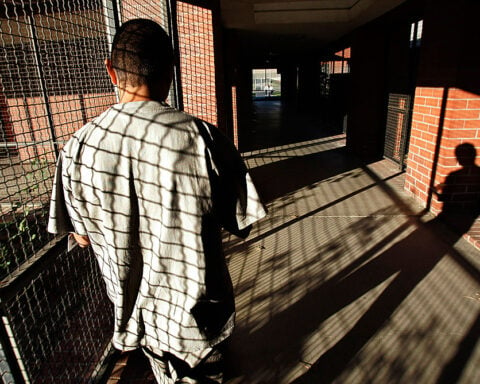By Daniel Wiessner and Ted Hesson
(Reuters) - A U.S. judge in Texas on Friday rejected a challenge by Republican-led states to a Biden administration program that allows hundreds of thousands of migrants from Cuba, Haiti, Nicaragua and Venezuela to apply for emergency entry into the United States.
U.S. District Court Judge Drew Tipton in Victoria, Texas, said the 21 states led by Texas lacked standing to pursue the 2023 lawsuit because they could not show that the program, which allows up to 30,000 people per month to enter the U.S., caused them any injury.
Some 234,000 Cubans, Haitians, Nicaraguans and Venezuelans had entered the U.S. through the program as of November 2023, according to U.S. Department of Homeland Security (DHS) statistics. To qualify, migrants must have a U.S. sponsor and enter the country by air.
Tipton in his ruling noted that the number of people illegally entering the U.S. from the four countries since the program was implemented had dramatically decreased by as much as 44%. The judge did not address the merits of the lawsuit, which claims that DHS lacked the authority to adopt the program.
The U.S. Department of Justice and the office of Republican Texas Attorney General Ken Paxton did not immediately respond to requests for comment.
President Joe Biden, a Democrat seeking another term in the Nov. 5 presidential election, has sought to expand legal pathways to the U.S. to discourage would-be migrants from crossing the U.S.-Mexico border illegally.
Republicans, including Biden's likely opponent, former President Donald Trump, have said the so-called "parole" programs go beyond the scope of what is allowable by law.
Record numbers of migrants have been caught crossing the U.S.-Mexico border illegally during Biden's presidency. Republicans say Biden should have kept Trump's more restrictive policies while Biden has argued that Republicans have refused to provide adequate border funding and pass legislation that would toughen enforcement.
The states argued in their lawsuit that the U.S. government's authority to use parole is "exceptionally limited" and can only be applied on a case-by-case basis. They claimed they faced irreparable harm because arriving migrants increase the cost of public services, including policing and emergency medical care.
Tipton, a Trump appointee, said in his ruling that the program was having the opposite effect.
"The court has before it a case in which Plaintiffs claim that they have been injured by a program that has actually lowered their out-of-pocket costs," he wrote.
(Reporting by Daniel Wiessner in Albany, New York and Ted Hesson in Washington, Editing by Rosalba O'Brien)

 UK inflation unexpectedly eases in December, which could reduce pressure in bond markets
UK inflation unexpectedly eases in December, which could reduce pressure in bond markets
 Body count from South African mine siege rises to 60
Body count from South African mine siege rises to 60
 US importers rush in goods from China as Trump tariff threat looms
US importers rush in goods from China as Trump tariff threat looms
 Novak Djokovic breaks a tie with Roger Federer for the most Grand Slam matches in tennis history
Novak Djokovic breaks a tie with Roger Federer for the most Grand Slam matches in tennis history
 China's RedNote: what you need to know about the app TikTok users are flocking to
China's RedNote: what you need to know about the app TikTok users are flocking to
 British author Neil Gaiman denies ever engaging in non-consensual sex as more accusers come forward
British author Neil Gaiman denies ever engaging in non-consensual sex as more accusers come forward








